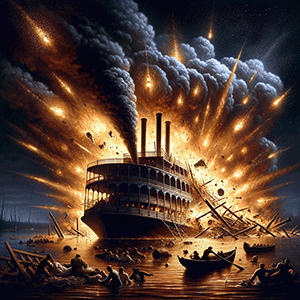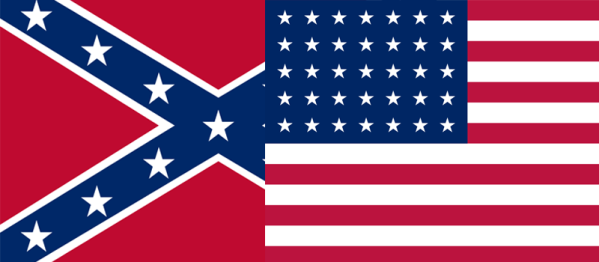On June 19, 1862, the United States Congress took a momentous step by banning slavery in all current and future U.S. territories. This historic action marked a significant shift in the nation's legislative landscape, setting the stage for the eventual abolition of slavery throughout the entire country. This article explores the context, the legislative process,... Continue Reading →
You’re Killing Me, Smalls!
Around three in the morning on May 13, 1862, the lookouts aboard a Union Naval vessel blockading Charleston Harbor was surprised to see a vessel bearing down upon his ship. Sounding the alarm, the gun ports were opened and all was brought to preparation to open fire. It was then that the lookout noticed that... Continue Reading →
The Wilderness – Day 2
The Battle of the Wilderness, fought in the tangled thickets of Virginia, remains one of the most harrowing confrontations of the American Civil War. It marked the beginning of Ulysses S. Grant's Overland Campaign, an aggressive push toward the Confederate capital of Richmond, and pitted him against the formidable Robert E. Lee, whose Army of... Continue Reading →
Sultana’s Bones
The SS Sultana was a Mississippi River steamboat that tragically sank on April 27, 1865, near Memphis, Tennessee. Originally constructed in 1863, the Sultana was a side-wheel steamboat used primarily for transporting cargo and passengers along the Mississippi River. During the final days of the American Civil War, the ship was tasked with a critical... Continue Reading →
Inaugurating a Civil War
On April 12, 1861, the calm of Charleston Harbor was shattered by the echo of cannon fire, marking the onset of the bloodiest conflict in American history—the Civil War. The bombardment of Fort Sumter by Confederate forces from South Carolina was not merely an act of aggression but a culmination of growing tensions over states'... Continue Reading →
Glorieta Pass
The Battle of Glorieta Pass, fought from March 26 to March 28, 1862, was a pivotal engagement in the American Civil War's Trans-Mississippi Theater. Often referred to as the "Gettysburg of the West," it thwarted a strategic attempt by the Confederacy to expand westward, aiming to secure resources and potentially open a new front. This... Continue Reading →
Finegan’s War
The Battle of Olustee, fought on February 20, 1864, in Baker County, Florida, stands as the largest battle fought in Florida during the American Civil War. This engagement, also known as the Battle of Ocean Pond, marked a significant moment in the war's Eastern Theater, illustrating the complexities of the conflict and its... Continue Reading →
The First Submarine Attack
On the chilly evening of February 17, 1864, the waters off Charleston Harbor became the stage for an unprecedented event in naval warfare. The CSS Hunley, a Confederate submarine, embarked on a daring mission that would forever alter the course of maritime military engagements. The CSS Hunley's journey to that fateful night was marked by... Continue Reading →
The 18th Vice President of the United States
In the annals of American history, few figures have traversed the arduous path from humble beginnings to the echelons of political power with the same steadfast commitment to principle as Henry Wilson, the 18th Vice President of the United States. Born amidst the bleakness of winter on February 16, 1812, in the rural confines of... Continue Reading →
The Doomed Experiment
It's February 1, 1861, and we're standing on the cusp of one of the most tumultuous periods in the United States - the Civil War. Now, focus on Texas, a state renowned for its fierce independence and spirit. This is the day Texas decided to sever its ties with the Union, a decision that was... Continue Reading →
All Men Are Born Equally Free
Salmon P. Chase, born on January 13, 1808, in Cornish, New Hampshire, stands as a towering figure in American history, notable for his staunch abolitionist stance, pivotal role in shaping the nation's financial systems, and influential tenure as the Chief Justice of the United States. His life, marked by a relentless pursuit of justice and... Continue Reading →
Charles Sumner
Charles Sumner, born on January 6, 1811, in Boston, Massachusetts, was a towering figure in American history known for his unyielding opposition to slavery and his enduring commitment to civil rights. As a prominent politician and senator, his legal acumen, eloquent oratory, and moral conviction positioned him at the forefront of the anti-slavery movement. Despite... Continue Reading →
Andrew Johnson
Andrew Johnson, the 17th President of the United States, was born on December 29, 1808, in a modest log cabin in Raleigh, North Carolina. Orphaned at a young age, Johnson never attended school. He was apprenticed as a tailor, a trade that he would continue throughout his early life. Despite his lack of formal education,... Continue Reading →
The Mankato Hangings
The mass hanging of 38 Dakota men on December 26, 1862, in Mankato, Minnesota, remains one of the most somber and profound tragedies in American history, reflecting a culmination of complex interactions between Native American tribes and the United States government. This event, occurring during the tumultuous years of the Civil War, was the largest... Continue Reading →
Richard Conner
Richard Conner, born on December 23, 1843, led a life marked by courage and service, particularly distinguished during the American Civil War. His journey from a young man to a decorated veteran reflects a tumultuous era in American history. Richard Conner was born into an America on the cusp of great conflict. His early life,... Continue Reading →
South Carolina Secedes
On December 20, 1860, a pivotal moment in American history unfolded as South Carolina declared its secession from the United States. This event marked the first secession of a state from the Union, setting the stage for the Civil War and fundamentally altering the nation's trajectory. South Carolina's decision to secede was primarily driven by... Continue Reading →
The 13th Amendment
The abolition of slavery in the United States, marked by the ratification of the 13th Amendment on December 18, 1865, stands as a pivotal moment in American history, fundamentally reshaping the nation's social, economic, and political landscape. This historical milestone culminated from a complex interplay of moral, economic, and political factors and had far-reaching consequences... Continue Reading →
General Order 11
General Ulysses S. Grant's General Order No. 11, issued on December 17, 1862 (the second day of Hanukkah), during the American Civil War, remains a notable and controversial directive in American history. This order commanded the expulsion of all Jews from Grant's military district, encompassing areas of Tennessee, Mississippi, and Kentucky. The context for General... Continue Reading →
John Brown’s Body
December 2, 1859, marked a pivotal moment in American history with the execution of John Brown, an abolitionist who believed in and advocated for the violent overthrow of the slavery system in the United States. His execution, following a raid on the federal armory at Harpers Ferry, Virginia (now West Virginia), became a landmark event... Continue Reading →
Franklin
The Battle of Franklin, fought on November 30, 1864, remains one of the most significant engagements in the American Civil War, not only for its ferocity but also for its role in shaping the war's final stages. The Battle of Franklin occurred during a particularly tumultuous period of the Civil War. It was part of... Continue Reading →



















